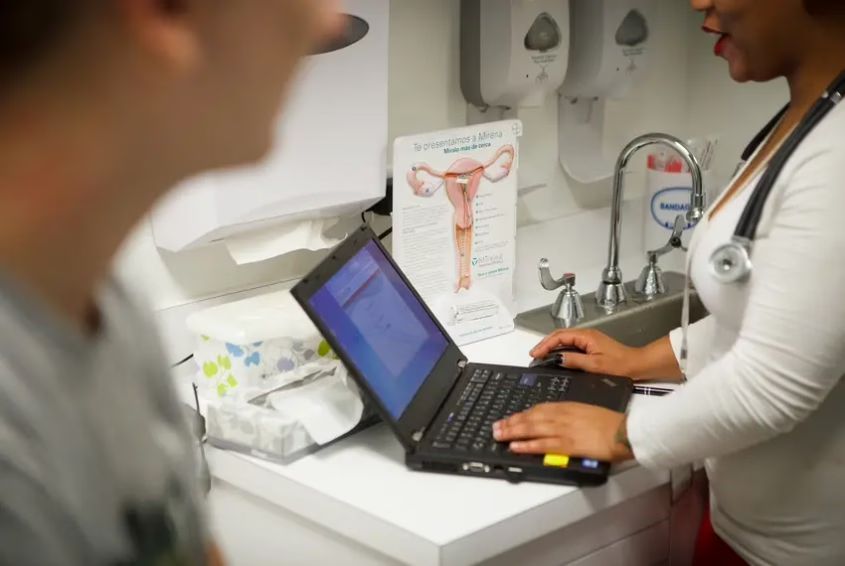By Karen Brooks Harper, The Texas Tribune
Oct. 7, 2021
“At least one major Texas abortion provider resumes procedure lawmakers tried to prohibit, after judge blocks near-total ban” was first published by The Texas Tribune, a nonprofit, nonpartisan media organization that informs Texans — and engages with them — about public policy, politics, government and statewide issues.
Sign up for The Brief, our daily newsletter that keeps readers up to speed on the most essential Texas news.
At least one major abortion provider on Thursday resumed providing the procedure to patients who had been previously shut out by Texas’ near-total ban, less than a day after a federal judge temporarily halted enforcement of the law.
“Last night we reached out to some of the patients that we had on a waiting list to come in and have abortions today,” Amy Hagstrom Miller, founder and CEO for Whole Woman’s Health, which runs four clinics in Texas and half a dozen in other states, said during a Thursday press call. “Folks whose pregnancies did have cardiac activity earlier in September, and we were able to see a few people … right away, when we opened the clinic.”
Whole Women’s Health is also booking consultation and abortion appointments for the coming days for patients who were unable to get abortions because they were too far along in their pregnancies, Miller said. Some other clinics in Texas have told her they’re doing the same, she said.
But many other providers and doctors affiliated with Whole Woman’s and other clinics are waiting until more solid rulings come, she said.
Texas appealed U.S. District Judge Robert Pitman’s Wednesday night’s ruling that put a temporary block on the law, the most restrictive in the nation because it allows abortion only in about the first six weeks of a pregnancy, before most realize they are pregnant. If the Texas law is ultimately upheld by higher courts, it won’t protect providers who perform those services during the legal pause on enforcement while the law makes its way through the legal process.
The case is now before the 5th U.S. Circuit Court of Appeals in New Orleans.
“That is part of why you don’t see every clinic in the state opening immediately,” Miller said. “Many of our physicians and staff are afraid that would, if the injunction is knocked down in the future, allow for these vigilantes to come back and sue us for every abortion we did in the interim. … It’s really the retroactive clause that gives people pause.”
Miller said her company is trying to serve as many people as possible for as long as the temporary injunction issued by Pitman lasts. Patient phone calls began pouring into the clinics on Thursday as word of the federal court in Austin’s action spread.
“The phone call volume has increased,” she said. “There’s actually hope from patients and from staff, and I think there’s a little desperation in that hope. Folks know that this opportunity could be short lived.”
Molly Duane, staff attorney for the Center for Reproductive Rights who is working with Whole Woman’s, said cases like this one could take years to shake out, but patients and clinics are running out of time.
“The fact remains that providers and patients in Texas cannot wait until this case or any other is finally adjudicated to final judgment — that process takes years,” Duane said. “What we know is that there are many brave providers out there in Texas who are relying on the assurances they got [from the ruling], and that number I believe will continue to grow.”
The new Texas law — Senate Bill 8 — went into effect Sept. 1, forcing all major abortion clinics to stop offering abortions after an embryo’s cardiac activity is detected, which can happen before many people know they’re pregnant. Some providers have stopped offering the procedure altogether out of fear of litigation, while others have had to curtail their services and shut down access to anyone beyond about six weeks into a pregnancy.
SB 8 relies on enforcement not from the state, but by private citizens who would sue abortion providers and anyone involved in helping someone get an abortion after a “heartbeat” is detected. Medical and legal experts say embryos at this developmental stage don’t yet possess a heart.
Wednesday’s order from the federal court in Austin opened the door, at least temporarily, to expanding those services to people seeking to terminate their pregnancies up to 18 weeks. But the law is constructed in such a way that people who violate it, even while it is being temporarily blocked, could be vulnerable to litigation if the law’s enforcement were to be reinstated and any existing suits could continue. The lawsuits can be filed up to four years after the procedure.
Already, abortion opponents have threatened to file suits and watch for potential violators to sue if the law is ultimately upheld.
A decision from the 5th Circuit on whether to uphold the law or further weaken it could come as early as Thursday.
Officials with Planned Parenthood of Greater Texas, which offers reproductive health services to people across the state, could not be reached immediately on Thursday. But officials with the national organization said late Wednesday that the organization was “hopeful” that the ruling would lead to a return to previous services — although no timeline was offered.
“This fight is far from over,” Alexis McGill Johnson, president of Planned Parenthood Federation of America, said in a Wednesday statement.
Until Wednesday’s order by Pitman, Texas’ new law successfully flouted the constitutional right to have an abortion before fetal viability established by Roe v. Wade in 1973 and subsequent rulings. That’s because of that novel private-citizen enforcement layer.
It capped conservative lawmakers’ decadeslong war to block access to the procedure, and Texas’ fast appeal to the 5th Circuit was expected.
Disclosure: Planned Parenthood has been a financial supporter of The Texas Tribune, a nonprofit, nonpartisan news organization that is funded in part by donations from members, foundations and corporate sponsors. Financial supporters play no role in the Tribune’s journalism. Find a complete list of them here.
Correction, Oct. 7, 2021: In a previous version of this story, the name of the federal judge who issued a Wednesday ruling was misspelled in one instance. His name is Robert Pitman, not Robert Pittman.
This article originally appeared in The Texas Tribune at https://www.texastribune.org/2021/10/07/Texas-abortion-law-providers/.
The Texas Tribune is a member-supported, nonpartisan newsroom informing and engaging Texans on state politics and policy. Learn more at texastribune.org.






























